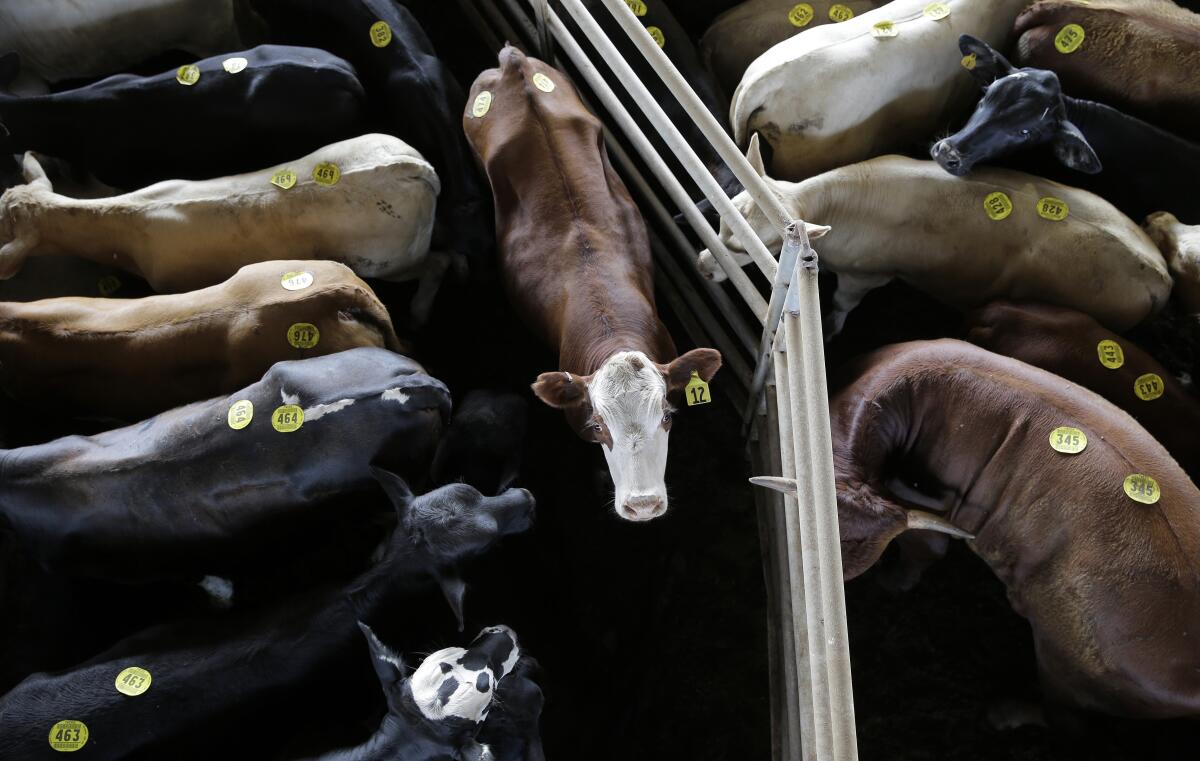Op-Ed: The trouble with being ‘beefatarians’

- Share via
“If the sound of beef sizzling on the grill brings tears of joy to your eyes, you’re a real beefatarian.” That’s the opening line of a TV ad produced by a European advertising campaign called Proud of European Beef.
Just more advertising silliness? No, because the European Union is paying 80% of the cost of it.
The United Nations Food and Agriculture Organization’s 2013 report “Tackling Climate Change Through Livestock” states that beef contributes 41% of the greenhouse gas emissions from the entire livestock sector and also has the highest emissions intensity — that is, the highest emissions per unit of protein — of any animal product. That is largely because ruminants belch and fart methane, an extremely potent greenhouse gas. As a result, rearing beef cattle brings about, on average, six times the contribution to global warming as nonruminant animals (for example, pigs) producing the same quantity of protein.
Since that report, the case against beef has strengthened. In 2015, a report from London’s Royal Institute of International Affairs pointed out that worldwide, meat and dairy consumption are rising at a rate that, if projected to 2050, would use 87% of the total quantity of emissions that is compatible with the Paris climate agreement’s objective of staying below a 2-degree Celsius increase in temperature.
A study published in Science in 2018 indicates that producing protein from soybeans in the form of tofu creates only 4% of the emissions required to produce the same quantity from beef cattle, while peas and nuts can both produce protein for less than 1% of emissions from beef cattle.
To meet the 2-degree target, the EU is aiming to be carbon-neutral by 2050. There is now a solid body of evidence that says this cannot be done without a global shift away from meat. Yet the European Commission spent 252 million euros ($298 million) promoting meat and dairy products from 2016 to 2020, compared with 146 million euros advertising fruit and vegetables.
“If you support sustainable farming by choosing European beef, you are real beefatarians,” says the Proud of European Beef advertisement — but without offering any explanation of why European beef is sustainable.
Climate targets are not the only things being undermined by the EU’s beef promotion. Its “Beating Cancer Plan” acknowledges that red and processed meats have been linked to higher risks of cancer. That view is shared by the World Health Organization, which lists processed meats, such as meats treated with salt, as Group 1 carcinogens — that is, products known to cause cancer. Red meat — beef, lamb, and pork — is listed as a Group 2A carcinogen, indicating that it probably causes cancer.
The European Commission has said it “will review, and where necessary propose to revise, all relevant policy instruments to deliver the additional emission reductions.” An international group of more than 60 scientists, including Jane Goodall and Bill McKibben, has called on the commission to align its promotion of agricultural products with the goals of avoiding catastrophic climate change and improving public health.
Arguably, beef advertising should go the same way as tobacco advertising. Before we get to that point, the least governments could do is avoid paying for it. But the EU is not alone in failing to stand up to the meat industry.
Americans eat four times as much beef as the world average, and beef production alone is responsible for more than 3% of U.S. greenhouse gas emissions. American beef, dairy and pork producers are heavily subsidized, both directly and by agricultural support that makes animal feed extremely cheap.
As a candidate for president, Joe Biden called climate change “the No. 1 issue facing humanity” and “the No. 1 issue for me.” Within days of taking office, he appeared to live up to that statement by placing a moratorium on oil and gas leases in the Arctic National Wildlife Refuge, scrapping the Keystone XL pipeline and announcing that the U.S. would rejoin the Paris agreement.
But when it comes to reducing emissions from agriculture, Biden’s announced plans do not go beyond incentives for sequestering more carbon in the soil and encouraging the use of additives in cattle feed to reduce methane emissions — a nice idea, but it’s likely to take many years before it is used on a scale that would have a significant effect.
Eating meat is not just a personal preference. The way that the animals eaten are raised and killed has long made it a legitimate matter of public concern. Now that we can see that eating red meat affects the entire planet in a manner that none of us want, it is time for governments to end their support for it.
Peter Singer is a professor of bioethics at Princeton University and founder of the nonprofit organization The Life You Can Save. His books include “Ethics in the Real World” and “Why Vegan?”
More to Read
A cure for the common opinion
Get thought-provoking perspectives with our weekly newsletter.
You may occasionally receive promotional content from the Los Angeles Times.








